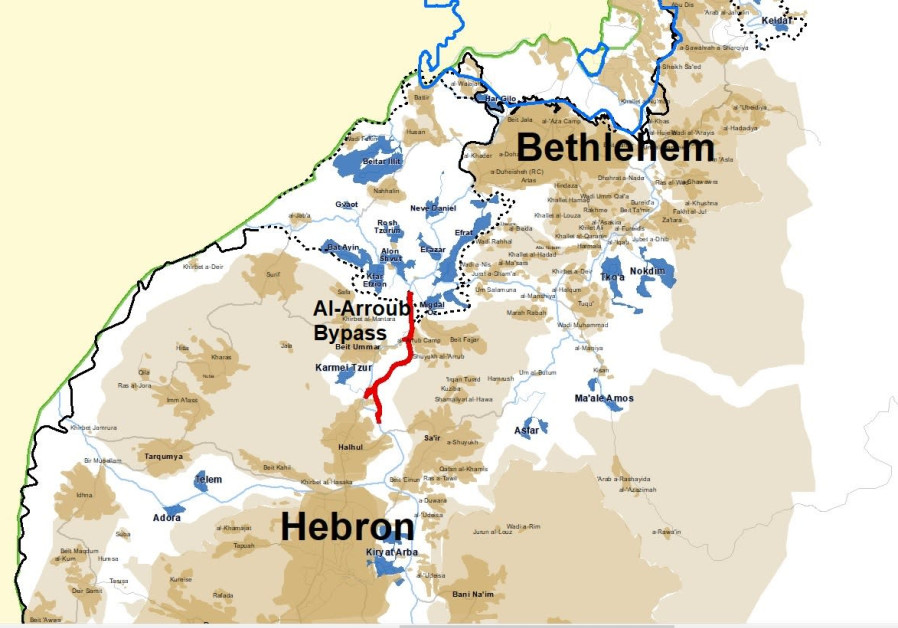IDF to confiscate Palestinian land for a new Gush Etzion-Hebron road

Gush Etzion-Hebron bypass road. (photo credit: PEACE NOW)
In a move to bolster the physical ties between sovereign Israel and the Jewish community of Hebron, Israel is moving forward on a critical bypass road that will expand the major Road 60 artery that links the Gush Etzion junction with the Kiryat Arba settlement.
“We’ve been waiting over 15 years for this road,” YESHA chief security officer Shlomo Vaknin said.
Settlers have long lobbied the government to build the road, which they said is needed to improve traffic safety and prevent terrorist attacks along the route.
The left-wing group Peace Now opposes the plan because it calls for the confiscation of 401 dunams of private Palestinian property from the towns of Beit Ommar and Halhul. The current Road 60 goes through both villages. The group also opposes the project because they believe it is part of Israel’s effort to annex the West Bank.
The new artery is nicknamed the “Al-Arub bypass road” and is known to settlers as the “Lev Yehuda” road. Work on the road – which ould be open to both Israeli and Palestinian traffic – could begin as early as this summer.
Already on April 3, the Civil Administration signed a confiscation order for property along a seven kilometer stretch of the new bypass road, according to Peace Now.
The group provided The Jerusalem Post with a copy of the confiscation order. The two villages have 60 days from the date on the order to appeal the plan.
“This expropriation is part of the government’s continued capitulation to the settlers, who want to build bypass roads throughout the West Bank. The settlers know very well that without good roads, the settlements will not be able to develop – but they demand that they be built ‘for security reasons,” Peace Now said.
The bypass roads have nothing to do with security, Peace Now said. The sole reason for building these roads is to “expand the settlements and advance the annexation of the territories to the State of Israel in order to prevent any chances of achieving peace and arriving at a two-state solution,” the organization said.
The project was first initiated in the late 1990s; it was frozen and then revived a decade later. New plans for the route were finalized in 2012, according to Peace Now. The project moved into its final phase after the cabinet approved NIS 800 million for such roads.
“We are talking about a road that is of extreme importance for the security and safety of the residents,” said Gush Etzion Regional Council head Shlomo Ne’eman. Aside from preventing terrorist attacks, there are also important traffic safety concerns here, he explained.
The roads in Judea and Samaria, such as this one, were laid out over a hundred years ago under the Ottoman Empire and have not changed that much, he said.
The existing road is not up to safety standards, Ne’eman said, adding that as a result, there are many car accidents and even fatalities, he said.
The time has come for the Israeli government to invest in the infrastructure of Judea and Samaria for the large population that lives there, Ne’eman said.
Join Jerusalem Post Premium Plus now for just $5 and upgrade your experience with an ads-free website and exclusive content. Click here>>





Comments are closed.